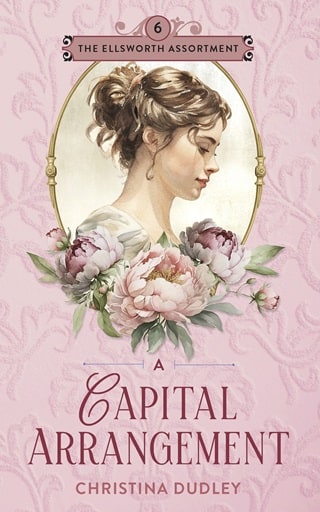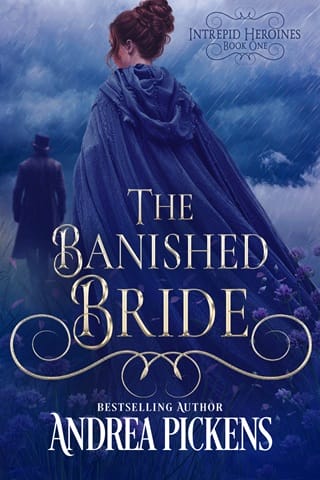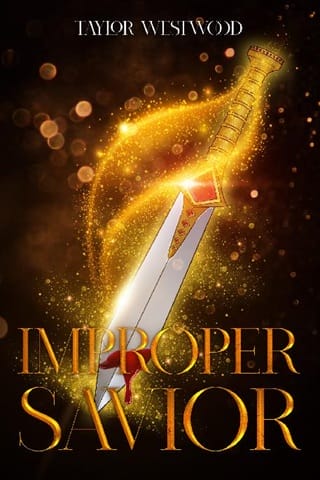Chapter 25
And ye shall know the truth, and the truth shall make you free.
—John 8:23, The Authorized Version (1611)
He was the last to know.
Which was his own fault, really, because he withdrew almost entirely into his work. In his defense, now that ground on the canal had been ceremonially broken, Clayton was plunged head over ears into a hundred preliminary tasks: meetings with potential resident engineers and undersecretaries; surveys; negotiations with every wharf- and warehouse-owner in the Cumberland Basin; the hiring of overseers, diggers, masons, bricklayers, smiths, carpenters, horses, and equipment.
And if his intended bride suffered neglect, Clayton could at least tell himself Priscilla would prefer sharing him with the Cumberland Arm than with daydreams and painful musings about Miss Ellsworth. These, thank heaven, he managed to push to a far corner of his mind by keeping so breathlessly busy. Only when he staggered to bed, exhausted, in the few minutes before sleep overtook him, did she come to him. She came dressed for a ball, or in the redingote in which he had last seen her, or sometimes even drenched, her bathing gown outlining her limbs. She came laughing or dancing or swimming. She came delighted or indignant. And Clayton's last conscious thought was always the same: She will marry and forget me. If only God would be so merciful to me.
It was a terse note from Priscilla which summoned him at last, one without greeting or signature: "Cissy and I have continued with the dance lessons. If you would be so good as to show your face in Marlboro Street, I would speak with you."
Feeling like a schoolboy called in to the headmaster's office, Clayton bent his steps toward Soho. The day was drizzly and dank, smoke and shadows obscuring all, but he paused in crossing Oxford Street, his gaze sweeping up and down. There was nothing to see, of course. Nothing and no one.
Priscilla's butler Keezer opened the door to his knock. "Mr. Clayton. It has been too long."
Clayton might have known Keezer since he was fourteen, but in his current mood even the butler's greeting sounded reproachful. He nodded shortly, allowing the man to take his hat and coat. "I'll show myself in. They're expecting me, I daresay."
The parlor of 12 Marlboro Street had undergone a transformation since Priscilla became its mistress. Gone were the framed maps and engineer's drawings, as well as Donald Brand's worn padded armchairs, to be replaced by satinwood Hepplewhite and gilded mirrors. Priscilla's harp occupied one corner and an open spinet another, but she was at neither instrument when he entered. Instead she stood at the window, arms crossed beneath her bosom.
"Mr. Clayton," murmured Miss Croy feebly. With a quick duck of a curtsey the companion retreated to a chair by the fireplace, her apologetic face seeming to say she would flee the room altogether if she could. Was it his imagination, or was he further down the page in Priscilla's black books than even he had suspected?
"Where has Keezer gone?" she asked. "We should have tea. It's dreadful out, and I suppose you walked."
She spoke of walking as if it were some shameful activity, and he paused in removing his gloves. "I am entirely to blame for Keezer's absence because I told him I would find my own way. Shall I call him? I need no tea for my own sake because the walk—and I did walk, I'm afraid—warmed me, but if you and Miss Croy would like some…?"
"Never mind, then." A frown fleeting across her young features, she made a restless movement. "Well? You may sit if you like."
"I don't mind standing, if you prefer to stand."
She did, apparently, her head turning toward the window again. For a minute nothing was heard but the muted crackle of the coal fire in the stove and Miss Croy's (also apologetic) throat-clearings.
With a grimace, Clayton resolved to take the bull by the horns. "Priscilla, I suspect you are not pleased with me."
A shrug.
"I know I have been very busy."
This met with a short laugh. "Have you? I would never have guessed."
Sarcasm? This was new.
Looking about him, Clayton chose a seat after all. Gracious—look what he had done to the poor girl, that now she should have acquired these traits. Poor Priscilla, who had always been cheerful and desirous of pleasing was now snappish and sarcastic? He must do better, he told himself for the thousandth time. He must accept his fate and do better. It was not fair to her. Because none of this was her fault. Not any of it.
His chest rose and fell in a silent sigh. "And I confess," he continued, feeling his way, "that once the money for the work was raised, I no longer gave priority to our dance lessons, seeing no further need to fetch and carry and curry favor with the great and good. Or, at least, with the wealthy."
She made no response but began to tap her fingernails on the casement. Tap-tap-tap, in rhythm with the raindrops.
So much for my excuses, he thought wryly. Shall I try buttering her up next, craven that I am?
Clearing his throat, he pinned a bland smile on his face. "I'm surprised you yourself saw the need to continue with lessons, Priscilla, considering how often Saint-Cloud has said that you excel at dancing."
At this she whipped around to say through tightened lips, "I continued because otherwise who knew when I might have another occasion to dance? You clearly only did so to meet your own ends, with no thought to how I might feel about it."
He stared at her, not in resentment, but rather in surprise. Surprise that turned him thoughtful. This direct young lady who spoke her mind was new to him. He had provoked her with his neglect, yes, but altogether he thought he preferred this version of Priscilla to the coy one who hinted and prompted and danced around subjects to try to make him say what she would like to hear.
Perhaps I have helped her after all.
"You're absolutely right," he agreed willingly. "I did not take into account your feelings on the matter but selfishly thought only of my ends."
"Why—yes. That's exactly what I mean, John." Some of the stiffness left her, though her lower lip trembled until she bit it, and she crossed her arms once more.
"Priscilla, won't you sit down, so we may discuss this?"
After a hesitation, she complied, taking the seat opposite. Miss Croy glanced up from her sewing, peeping from one to the other.
"And it is not only in regard to the dance lessons where I have vexed you," he went on, determined to have it all out. "I have left you alone to plan the wedding breakfast."
When this met only with an ambiguous "hmm," he knew there were still more wrongs charged to him.
Very well, then.
"But it has gone on longer than that, Priscilla," Clayton resumed, putting his shoulder to the wheel. "I have been an indifferent lover, making little to no effort to woo you, and thus jeopardizing our future happiness."
Still she regarded him with creased brow and flared nostrils, and he felt the first flicker of annoyance. His own eyebrow arched. "Have you anything else you would like to add to my account before I attempt to discharge it?"
Giving one short, sharp shake of the head, she blurted, "What do you mean, ‘discharge it'?"
He shifted his chair nearer hers, turning his back to Miss Croy's ever-present presence. "I mean, Priscilla, shall we try again?" he murmured. "Wipe the slate clean and try—in earnest—to make our match a happy one?"
Truthfully, he expected her to unbend and for a smile to bloom on her features. He even steeled himself to receive a clutch of his arm and to smile and clutch in return.
But she did neither.
Instead she took a deep, deep breath and met his gaze squarely. "John. I am willing to pardon you. I do, in fact pardon you, though everything you say is true, and it has hurt me a great deal." Ignoring his conciliatory nod, she rose again to pace the distance to the window and back. Seeing him get to his own feet, she waved him down. "Don't bother standing, John. No—sit back down. I would prefer you to be seated because of what I have to say."
"What you have to say?" he echoed warily. But he obeyed her command and resumed his seat.
"Yes. What I have to say." Another deep breath followed, though it was an uneven one. "Which is—I mean to say—I no longer want to marry you."
"Wh-what?" And indeed, had he still been standing, he might well have collapsed.
Behind him, a fearful whimper leaked from Cecelia Croy.
"You heard me, John. I no longer want to marry you."
"But—you just said you pardoned me!"
"And so I do, pardon you. But it's too late to think about making our match a happy one."
Clayton put his hands to his face and rubbed it, half to rouse himself from what must be delirium, and half to hide the hope shooting up inside him. He had no idea if it was working, but thankfully Priscilla continued her pacing, her hands stretching and balling into fists repeatedly.
"I know Papa loved you like a son, and I know he was afraid of what might happen to me when he was gone, but there is no need to kill two birds with one stone. Especially if neither one of us wants it particularly. That is, I thought I wanted to marry you," she continued, as Clayton now had his elbows on his knees and his head in his hands, fingers twisting through his dark hair. "Because it was exciting to be engaged and because you're handsome and because you know or have met important people. But John—it isn't enough. It wasn't enough. All those things might be true, but it's also true that your mind is always on your work, and you're not very—good—about making conversation, and you can be so—remote—and intimidating! You never say nice things to me, and you just admitted that the dancing lessons were all for the stupid canal and not at all for my sake—"
"Priscilla—"
But she would not be interrupted. "Yes, I said the ‘stupid' canal!" she fired up. "I hate your canal! Your—your—ditch! I hate every canal which was ever dug! They always kept Papa from me, and now they keep you away. The only thing I like about them is the money they bring. That's right. Papa left me a tidy fortune, I know, and it is mine, though Mr. Braham manages it for now. And I say your salary will be paid out of it for the duration of the work, as Papa intended, but I don't see why I should hand the rest to you, so that you might go on and on, grubbing in the dirt and dragging me to and fro across the kingdom!"
Good heavens! If Clayton had ever wished Priscilla Brand would simply speak her mind without beating about the bush, here it was with a vengeance!
Her outburst proved too much for her in the end, for the next instant she broke out in a storm of tears which brought Miss Croy scurrying across the room, only to be pushed away with a mortified "Leave me be, Cissy!"
"Oh, Mr. Clayton," dithered Miss Croy, "you mustn't pay any attention to what she says today. She's been in a perfect state—"
"Of course he must pay attention to what I say!" roared Priscilla with a stamp of her foot. "Isn't that just the trouble—that he never pays any attention to what I say or what I do or what I think or feel or—or anything!"
Her companion fluttered distraught hands, retreating, but by this time Clayton had mastered his expression, despite the unexpected urge to laugh now adding to the welter of emotions assailing him.
"Priscilla," he said again, his voice steadier than he would have thought possible. "Priscilla, you do not have to marry me if you don't want to."
She stopped suddenly. Stopped with the pacing and the waving fists and flying tears. "I—don't?"
"Of course not. I'm no ogre." His lips curved derisively. "Or if I am, I'm just the neglectful, remote, grubbing, dull sort of ogre. Not the lock-you-in-a-room-until-you-marry-me variety."
"But—" she was breathing now as if she had been running up a hill, and she quickly resumed her seat opposite him, her color coming and going. "But John—really? You won't make me, even though you promised Papa?"
"No." He was trying to stay in the conversation with her, while his mind leapt far, far ahead. He saw himself going straight from Marlboro Street to call on the Huftons. To call on Miss Ellsworth. He would have to keep himself on a tight rein. She had thought of him as Miss Brand's intended almost as long as she had known him; he could not therefore, that very afternoon, throw himself at her feet—
"But what about my fortune?" demanded Priscilla.
He blinked at her, unwittingly provoking her yet again (could the man not even pay attention when he was being jilted?). "Your fortune?" he said bemused. "It will remain yours."
"That's precisely what I mean!" she declared. "Didn't you want to marry me because I am an heiress?"
"Frankly, Priscilla, I think you will derive more enjoyment from your money than I would have," answered Clayton. "Though I do thank you for honoring the terms of my contracted salary." His brow furrowed thoughtfully, however. While he didn't mind losing Priscilla's fortune, would Miss Ellsworth's family object to his resultingly modest means? "Modest"? Impoverished, more like.
"…Then I am my own person, and I may marry whom I please," she was saying, and he shook the clouds from his head again.
"I beg your pardon. Did you—have another person in mind?"
Her chin came up and she flushed a deep rose. "Possibly. Only Cissy knows because, of course, I was engaged, so there was no use in thinking or saying or wishing anything."
"Good heavens. Is it Saint-Cloud?"
Priscilla's mouth dropped open and behind him Miss Croy screeched. "How—how did you know?" gasped his former betrothed.
"It's hardly an unfathomable mystery," Clayton couldn't help laughing. "In fact, I can't think of another person it could be. But I'm afraid it won't do, Priscilla."
"What do you mean, it won't do?"
"I mean that it is one thing to break our engagement because we are not inclined to marry, but another entirely for me to approve a match which your father would most certainly have forbidden. If I am not your husband or intended husband, the fact remains that I am your guardian. And in that role I certainly must fulfill my obligation to Mr. Brand."
Priscilla sputtered, firing up again, but Clayton held up his palms to forestall her. "I'm sorry, but it is so. You are my ward until you come of age, and as your guardian I cannot allow it."
"You monster!" she cried. "I suppose because he is poor and humble and works for his bread? So are you, you force me to point out."
He made a motion, as if touching the brim of a hat. "Too right. But listen to me, Priscilla. If you and I had married, I would have continued with my work. I would not have retired to live off of your fortune. Do you think the same could be said for Saint-Cloud?"
"I—don't know. I suppose not," she admitted. "Although he has once or twice expressed his resentment of Mr. Wilson who owns the academy—"
"Then there is a Mr. Wilson?"
"Of course there is. He even appeared once when you weren't there. Quite a perfumed, wigged, puffed-up old fellow who didn't help Hub—Mr. Saint-Cloud one bit! He only observed for a minute and then glided away. Mr. Saint-Cloud said to me on that occasion that he dreamed of opening his own school for dance." Her eyes lit up suddenly. "Oh, John! What if I were to invest in Mr. Saint-Cloud, so that he could open just such an academy? I would buy—shares—in it. It would be an investment. And then he would earn his own money and more of it, and—and—we could see what sort of person he is."
Clayton regarded her, one corner of his mouth lifting. What a day for surprises! This forthright, enterprising Priscilla—! It really was so, then—he and she had been a bad match. Instead of bringing out each other's best qualities, they had only succeeded in frustrating each other.
"It's not a bad plan," he said. "Though we had better sound Braham for his opinion before you go making suggestions to the dance master. And it wouldn't hurt to remind you that, if you were to elope with Saint-Cloud, he would likely never see a penny. I think your father then divides your fortune between you, me, and a trust for a future canal, or some such."
"I won't elope, then," she assured him calmly. "Because if I don't want you to marry me for my money, nor do I want anyone else to. And I certainly, certainly don't want my fortune going to any more tiresome old canals."
Then he did laugh, and the two unsuccessful lovers regarded each other with the first easy goodwill they had ever experienced together.
But Clayton was too energetic a fellow to loll about when he had more pressing matters to attend to. Rising, he retrieved his gloves from the table and began to tug them back on. "I will write to Braham to call here tomorrow or the day after, and we will share our news with him. Hmm—I suppose I'd better speak to the vicar of St. Anne's as well, before he reads the banns for the third time."
"Please do, or Cissie and I will have an awkward time of it this Sunday," agreed Priscilla.
"And I suppose I may ask you to cancel the arrangements for our wedding breakfast?"
She favored him with a wry look. "You had better leave it to me, for I would lay odds you don't even remember which hotel it was going to be at."
His guilty grin was answer enough.
"Exactly." She shook her head in amused exasperation. "It's just as well, since I don't know if anyone would have attended after all. They have a wedding of their own to plan, you know, over there in Green Street."
Clayton was very still. "A wedding in Green Street? Is—Rotherwood—finally engaged, then?"
"Of course he is! And has been for days," Priscilla said incredulously, marveling anew at this evidence of his obliviousness. "Everyone in London has been talking of little else. Even the pupils at the dance academy knew of it. But Mr. Rotherwood doesn't live in Green Street, I don't think. Of course I was referring to the Huftons."
He shook his head, perplexed. "Huftons? You can't mean Miss Hufton. You must mean Miss Ellsworth."
"What? No! I mean Miss Hufton."
"Is engaged to Rotherwood?"
Before Clayton or Priscilla could throttle each other in their impatience to be understood, Miss Croy made haste to interpose. "Miss Hufton is engaged to Mr. Dodson. Mr. Rotherwood is engaged to one Miss Hapgood."
Clayton stared at her, and she gave a little gasp at his paleness. "Say that again, Miss Croy."
Carefully, she repeated her words.
He released a long breath. Sagging visibly in relief, he took hold of the back of the sofa to steady himself. "Not Miss Ellsworth, then."
"Good gracious," said Priscilla, who had not taken her eyes from him. "Good…gracious, John. This news affects you mightily."
He pressed his lips together. Because what was there to say, in any case?
"You care for her," she murmured, pondering.
It was not a question.
"You care for Miss Ellsworth."
Denial was impossible, even to spare her feelings. "I…did not mean to."
She gave a mirthless chuckle. "I'm sure you didn't."
"I'm sorry, Priscilla."
"Was it in Bognor that you began to like her?"
"Yes."
She was silent a minute. However willingly she had jilted him, and however relieved she might be for the way matters ended, it would be unreasonable to expect any young lady to welcome such a blow to her vanity. And he, though he felt a great weight lifted off to have the truth known, did not want to add insult to injury by dashing off to see his beloved.
But while Priscilla might have been young and possessed of an ordinary amount of self-love, their meeting had done its work. If her betrothed had not loved her, it had nevertheless been she who sued for liberty from him, sued and prevailed. Nor had she been positively denied Mr. Saint-Cloud at some future date, if he could only prove himself.
Slowly she regained her composure, and he felt a new admiration for her, to see her gather her dignity about her. He need not worry for Priscilla, it seemed. She was learning her own strength.
"I will see you out, John," she said. "Cissy, wait here for me."
In the entryway she handed him his hat."Does Miss Ellsworth know of your feelings, John?"
"Of course not."
That provoked an arch smile. "But she will, I imagine. And something tells me you will not be so desultory in your courtship of her as you were when your heart was not concerned."
But this was too tender a subject for him to banter about, and Priscilla relented, wondering wistfully if Mr. Saint-Cloud ever thought of her with such a mixture of fierceness and doubt in his eyes. Holding out her hand, Clayton took it and carried it to his lips.
Then he was gone.
 Fullepub
Fullepub 



